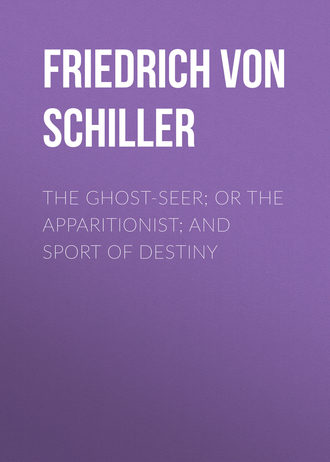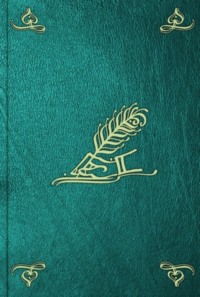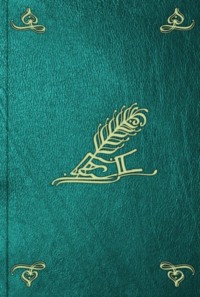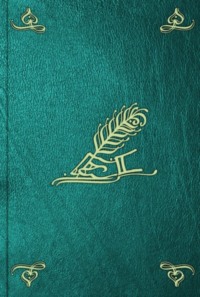 полная версия
полная версияThe Ghost-Seer; or the Apparitionist; and Sport of Destiny
“I come,” said the prince, “to request an explanation of you on two subjects. You owe me the one, and it shall not be to your disadvantage if you grant me the other.”
“My part is now acted,” replied the Sicilian, “my destiny is in your hands.”
“Your sincerity alone can mitigate your punishment.
“Speak, honored prince, I am ready to answer you. I have nothing now to lose.”
“You showed me the face of the Armenian in a looking-glass. How was this effected?”
“What you saw was no looking-glass. A portrait in crayons behind a glass, representing a man in an Armenian dress, deceived you. My quickness, the twilight, and your astonishment favored the deception. The picture itself must have been found among the other things seized at the inn.”
“But how could you read my thoughts so accurately as to hit upon the Armenian?”
“This was not difficult, your highness. You must frequently have mentioned your adventure with the Armenian at table in the presence of your domestics. One of my accomplices accidentally got acquainted with one of your domestics in the Giudecca, and learned from him gradually as much as I wished to know.”
“Where is the man?” asked the prince; “I have missed him, and doubtless you know of his desertion.”
“I swear to your honor, sir, that I know not a syllable about it. I have never seen him myself, nor had any other concern with him than the one before mentioned.”
“Proceed with your story,” said the prince.
“By this means, also, I received the first information of your residence and of your adventures at Venice; and I resolved immediately to profit by them. You see, prince, I am sincere. I was apprised of your intended excursion on the Brenta. I prepared for it, and a key that dropped by chance from your pocket afforded me the first opportunity of trying my art upon you.”
“How! Have I been mistaken? The adventure of the key was then a trick of yours, and not of the Armenian? You say this key fell from my pocket?”
“You accidentally dropped it in taking out your purse, and I seized an opportunity, when no one noticed me, to cover it with my foot. The person of whom you bought the lottery-ticket acted in concert with me. He caused you to draw it from a box where there was no blank, and the key had been in the snuff-box long before it came into your possession.”
“I understand you. And the monk who stopped me in my way and addressed me in a manner so solemn.”
“Was the same who, as I hear, has been wounded in the chimney. He is one of my accomplices, and under that disguise has rendered me many important services.”
“But what purpose was this intended to answer?”
“To render you thoughtful; to inspire you with such a train of ideas as should be favorable to the wonders I intended afterwards to show you.”
“The pantomimical dance, which ended in a manner so extraordinary, was at least none of your contrivance?”
“I had taught the girl who represented the queen. Her performance was the result of my instructions. I supposed your highness would be not a little astonished to find yourself known in this place, and (I entreat your pardon, prince) your adventure with the Armenian gave me reason to hope that you were already disposed to reject natural interpretations, and to attribute so marvellous an occurrence to supernatural agency.”
“Indeed,” exclaimed the prince, at once angry and amazed, and casting upon me a significant look; “indeed, I did not expect this.”
[Neither did probably the greater number of my readers. The circumstance of the crown deposited at the feet of the prince, in a manner so solemn and unexpected, and the former prediction of the Armenian, seem so naturally and obviously to aim at the same object that at the first reading of these memoirs I immediately remembered the deceitful speech of the witches in Macbeth: – “Hail to thee, Thane of Glamis! All hail, Macbeth! that shall be king hereafter!” and probably the same thing has occurred to many of my readers. When a certain conviction has taken hold upon a man’s mind in a solemn and xtraordinary manner, it is sure to follow that all subsequent ideas which are in any way capable of being associated with this conviction should attach themselves to, and in some degree seem to be consequent upon it. The Sicilian, who seems to have had no other motive for his whole scheme than to astonish the prince by showing him that his rank was discovered, played, without being himself aware of it, the very game which most furthered the view of the Armenian; but however much of its interest this adventure will lose if I take away the higher motive which at first seemed to influence these actions, I must by no means infringe upon historical truth, but must relate the facts exactly as they occurred.
– Note of the German Editor.]“But,” continued he, after a long silence, “how did you produce the figure which appeared on the wall over the chimney?”
“By means of a magic lantern that was fixed in the opposite window-shutter, in which you have undoubtedly observed an opening.”
“But how did it happen that not one of us perceived the lantern?” asked Lord Seymour.
“You remember, my lord, that on your re-entering the room it was darkened by a thick smoke of frankincense. I likewise took the precaution to place the boards which had been taken up from the floor upright against the wall near the window. By these means I prevented the shutter from immediately attracting observation. Moreover, the lantern remained covered by a slide until you had taken your places, and there was no further reason to apprehend that you would institute any examination of the saloon.”
“As I looked out of the window in the other pavilion,” said I, “I fancied I heard a noise like that of a person placing a ladder against the side of the house. Was I right?”
“Exactly; it was the ladder upon which my assistants stood to direct the magic-lantern.”
“The apparition,” continued the prince, “had really a superficial likeness to my deceased friend, and what was particularly striking, his hair, which was of a very light color, was exactly imitated. Was this mere chance, or how did you come by such a resemblance?”
“Your highness must recollect that you had at table a snuff-box by your plate, with an enamelled portrait of an officer in a uniform. I asked whether you had anything about you as a memento of your friend, and as your highness answered in the affirmative, I conjectured that it might be the box. I had attentively examined the picture during supper, and being very expert in drawing and not less happy in taking likenesses, I had no difficulty in giving to my shade the superficial resemblance you have perceived, the more so as the marquis’ features are very marked.”
“But the figure seemed to move?”
“It appeared so, yet it was not the figure that moved but the smoke on which the light was reflected.”
“And the man who fell down in the chimney spoke for the apparition?”
“He did.”
“But he could not hear your question distinctly.”
“There was no occasion for it. Your highness will recollect that I cautioned you all very strictly not to propose any question to the apparition yourselves. My inquiries and his answers were preconcerted between us; and that no mistake might happen, I caused him to speak at long intervals, which he counted by the beating of a watch.”
“You ordered the innkeeper carefully to extinguish every fire in the house with water; this was undoubtedly – ”
“To save the man in the chimney from the danger of being suffocated; because the chimneys in the house communicate with each other, and I did not think myself very secure from your retinue.”
“How did it happen,” asked Lord Seymour, “that your ghost appeared neither sooner nor later than you wished him?”
“The ghost was in the room for some time before I called him, but while the room was lighted, the shade was too faint to be perceived. When the formula of the conjuration was finished, I caused the cover of the box, in which the spirit was burning, to drop down, the saloon was darkened, and it was not till then that the figure on the wall could be distinctly seen, although it had been reflected there a considerable time before.”
“When the ghost appeared, we all felt an electric shock. How was that managed?”
“You have discovered the machine under the altar. You have also seen that I was standing upon a silk carpet. I directed you to form a half-moon around me, and to take each other’s hands. When the crisis approached, I gave a sign to one of you to seize me by the hair. The silver crucifix was the conductor, and you felt the electric shock when I touched it with my hand.”
“You ordered Count O – and myself,” continued Lord Seymour, “to hold two naked swords crossways over your head, during the whole time of the conjuration; for what purpose?”
“For no other than to engage your attention during the operation; because I distrusted you two the most. You remember, that I expressly commanded you to hold the sword one inch above my head; by confining you exactly to this distance, I prevented you from looking where I did not wish you. I had not then perceived my principal enemy.”
“I own,” cried Lord Seymour, “you acted with due precaution – but why were we obliged to appear undressed?”
“Merely to give a greater solemnity to the scene, and to excite your imaginations by the strangeness of the proceeding.”
“The second apparition prevented your ghost from speaking,” said the prince. “What should we have learnt from him?”
“Nearly the same as what you heard afterwards. It was not without design that I asked your highness whether you had told me everything that the deceased communicated to you, and whether you had made any further inquiries on this subject in his country. I thought this was necessary, in order to prevent the deposition of the ghost from being contradicted by facts with which you were previously acquainted. Knowing likewise that every man in his youth is liable to error, I inquired whether the life of your friend had been irreproachable, and on your answer I founded that of the ghost.”
“Your explanation of this matter is satisfactory,” resumed the prince, after a short silence; “but there remains a principal circumstance which I must ask you to clear up.”
“If it be in my power, and – ”
“No conditions! Justice, in whose hands you now are, might perhaps not interrogate you with so much delicacy. Who was this unknown at whose feet we saw you fall? What do you know of him? How did you get acquainted with him? And in what way was he connected with the appearance of the second apparition?
“Your highness” —
“On looking at him more attentively, you gave a loud scream, and fell at his feet. What are we to understand by that?”
“This man, your highness” – He stopped, grew visibly perplexed, and with an embarrassed countenance looked around him. “Yes, prince, by all that is sacred, this unknown is a terrible being.”
“What do you know of him? What connection have you with him? Do not hope to conceal the truth from us.”
“I shall take care not to do so, – for who will warrant that he is not among us at this very moment?”
“Where? Who?” exclaimed we altogether, half-amused, half-startled, looking about the room. “That is impossible.”
“Oh! to this man, or whatever he may be, things still more incomprehensible are possible.”
“But who is he? Whence comes he? Is he an Armenian or a Russian? Of the characters be assumes, which is his real one?”
“He is nothing of what he appears to be. There are few conditions or countries of which he has not worn the mask. No person knows who he is, whence he comes, or whither he goes. That he has been for a long time in Egypt, as many pretend, and that he has brought from thence, out of a catacomb, his, occult sciences, I will neither affirm nor deny. Here we only know him by the name of the Incomprehensible. How old, for instance, do you suppose he is?”
“To judge from his appearance he can scarcely have passed forty.”
“And of what age do you suppose I am?”
“Not far from fifty.”
“Quite right; and I must tell you that I was but a boy of seventeen when my grandfather spoke to me of this marvellous man whom he had seen at Famagusta; at which time he appeared nearly of the same age as he does at present.”
“This is exaggerated, ridiculous, and incredible.”
“By no means. Were I not prevented by these fetters I could produce vouchers whose dignity and respectability should leave you no room for doubt. There are several credible persons who remember having seen him, each, at the same time, in different parts of the globe. No sword can wound, no poison can hurt, no fire can burn him; no vessel in which he embarks can be wrecked. Time itself seems to lose its power over him. Years do not affect his constitution, nor age whiten his hair. Never was he seen to take any food. Never did he approach a woman. No sleep closes his eyes. Of the twenty-four hours in the day there is only one which he cannot command; during which no person ever saw him, and during which he never was employed in any terrestrial occupation.”
“And this hour is?”
“The twelfth in the night. When the clock strikes twelve at midnight he ceases to belong to the living. In whatever place he is he must immediately be gone; whatever business he is engaged in he must instantly leave it. The terrible sound of the hour of midnight tears him from the arms of friendship, wrests him from the altar, and would drag him away even in the agonies of death. Whither he then goes, or what he is then engaged in, is a secret to every one. No person ventures to interrogate, still less to follow him. His features, at this dread ful hour, assume a sternness of expression so gloomy and terrifying that no person has courage sufficient to look him in the face, or to speak a word to him. However lively the conversation may have been, a dead silence immediately succeeds it, and all around wait for his return in respectful silence without venturing to quit their seats, or to open the door through which he has passed.”
“Does nothing extraordinary appear in his person when he returns?” inquired one of our party.
“Nothing, except that he seems pale and exhausted, like a man who has just suffered a painful operation, or received some disastrous intelligence. Some pretend to have seen drops of blood on his linen, but with what degree of veracity I cannot affirm.”
“Did no person ever attempt to conceal the approach of this hour from him, or endeavor to preoccupy his mind in such a manner as to make him forget it?”
“Once only, it is said, he missed the appointed time. The company was numerous and remained together late in the night. All the clocks and watches were purposely set wrong, and the warmth of conversation carried him away. When the stated hour arrived he suddenly became silent and motionless; his limbs continued in the position in which this instant had arrested them; his eyes were fixed; his pulse ceased to beat. All the means employed to awake him proved fruitless, and this situation endured till the hour had elapsed. He then revived on a sudden without any assistance, opened his eyes, and resumed his speech at the very syllable which he was pronouncing at the moment of interruption. The general consternation discovered to him what had happened, and he declared, with an awful solemnity, that they ought to think themselves happy in having escaped with the fright alone. The same night he quitted forever the city where this circumstance had occurred. The common opinion is that during this mysterious hour he converses with his genius. Some even suppose him to be one of the departed who is allowed to pass twenty-three hours of the day among the living, and that in the twenty-fourth his soul is obliged to return to the infernal regions to suffer its punishment. Some believe him to be the famous Apollonius of Tyana; and others the disciple of John, of whom it is said, ‘He shall remain until the last judgment.’”
“A character so wonderful,” replied the prince, “cannot fail to give rise to whimsical conjectures. But all this you profess to know only by hearsay, and yet his behavior to you and yours to him, seemed to indicate a more intimate acquaintance. Is it not founded upon some particular event in which you have yourself been concerned? Conceal nothing from us.”
The Sicilian looked at us doubtingly and remained silent.
“If it concerns something,” continued the prince, “that you do not wish to be made known, I promise you, in the name of these two gentlemen, the most inviolable secrecy. But speak candidly and without reserve.”
“Could I hope,” answered the prisoner, after a long silence, “that you would not make use of what I am going to relate as evidence against me, I would tell you a remarkable adventure of this Armenian, of which I myself was witness, and which will leave you no doubt of his supernatural powers. But I beg leave to conceal some of the names.”
“Cannot you do it without this condition?”
“No, your highness. There is a family concerned in it whom I have reason to respect.”
“Let us hear your story.”
“It is about five years ago,” began the Sicilian, “that at Naples, where I was practising my art with tolerable success, I became acquainted with a person of the name of Lorenzo del M – , chevalier of the Order of St. Stephen, a young and rich nobleman, of one of the first families in the kingdom, who loaded me with kindnesses, and seemed to have a great esteem for my occult knowledge. He told me that the Marquis del M – nte, his father, was a zealous admirer of the cabala, and would think himself happy in having a philosopher like myself (for such he was pleased to call me) under his roof. The marquis lived in one of his country seats on the sea-shore, about seven miles from Naples. There, almost entirely secluded from the world, he bewailed, the loss of a beloved son, of whom he had been deprived by a terrible calamity. The chevalier gave me to understand that he and his family might perhaps have occasion to employ me on a matter of the most grave importance, in the hope of gaining through my secret science some information, to procure which all natural means had been tried in vain. He added, with a very significant look, that he himself might, perhaps at some future period, have reason to look upon me as the restorer of his tranquillity, and of all his earthly happiness. The affair was as follows: —
“This Lorenzo was the younger son of the marquis, and for that reason had been destined for the church; the family estates were to descend to the eldest. Jeronymo, which was the name of the latter, had spent many years on his travels, and had returned to his country about seven years prior to the event which I am about to relate, in order to celebrate his marriage with the only daughter of the neighboring Count C – tti. This marriage had been determined on by the parents during the infancy of the children, in order to unite the large fortunes of the two houses. But though this agreement was made by the two families, without consulting the hearts of the parties concerned, the latter had mutually pledged their faith to each other in secret. Jeronymo del M – and Antonia C – had been brought up together, and the little restraint imposed on two children, whom their parents were already accustomed to regard as destined for each other, soon produced between them a connection of the tenderest kind; the congeniality of their tempers cemented this intimacy; and in later years it ripened insensibly into love. An absence of four years, far from cooling this passion, had only served to inflame it; and Jeronymo returned to the arms of his intended bride as faithful and as ardent as if they had never been separated.
“The raptures occasioned by his return had not yet subsided, and the preparations for the happy day were advancing with the utmost zeal and activity, when the bridegroom disappeared. He used frequently to pass whole afternoons in a summer-house which commanded a prospect of the sea, and was accustomed to take the diversion of sailing on the water. One day, on an evening spent in this manner, it was observed that he remained absent a much longer time than usual, and his friends began to be very uneasy on his account. Messengers were despatched after him, vessels were sent to sea in quest of him; no person had seen him. None of his servants were missed; he must, therefore, have gone alone. Night came on, and he did not appear. The next morning dawned; the day passed, the evening succeeded – , Jeronymo came not. Already they had begun to give themselves up to the most melancholy conjectures when the news arrived that an Algerine pirate had landed the preceeding day on that coast, and carried off several of the inhabitants. Two galleys which were ready for sea were immediately manned; the old marquis himself embarked in one of them, to attempt the deliverance of his son at the peril of his own life. On the third morning they perceived the corsair. They had the advantage of the wind; they were just about to overtake the pirate, and had even approached so near that Lorenzo, who was in one of the galleys, fancied that he saw upon the deck of the adversary’s ship a signal made by his brother, when a sudden storm separated the vessels. Hardly could the damaged galleys sustain the fury of the tempest. The pirate in the meantime had disappeared, and the distressed state of the other vessels obliged them to land at Malta. The affliction of the family knew no bounds. The distracted old marquis tore his gray hairs in the utmost violence of grief; and fears were entertained for the life of the young countess. Five years were consumed in fruitless inquiries. Diligent search was made along all the coast of Barbary; immense sums were offered for the ransom of the poor marquis, but no person came forward to claim them. The only probable conjecture which remained for the family to form was, that the same storm which had separated the galleys from the pirate had destroyed the latter, and that the whole ship’s company had perished in the waves.
“But, however this supposition might be, it did not by any means amount to a certainty, and could not authorize the family altogether to renounce the hope that the lost Jeronymo might again appear. In case, however, that he was really dead, either the family must become extinct, or the younger son must relinquish the church, and assume the rights of the elder. As justice, on the one hand, seemed to oppose the latter measure, so, on the other hand, the necessity of preserving the family from annihilation required that the scruple should not be carried too far. In the meantime through grief and the infirmities of age, the old marquis was fast sinking to his grave; every unsuccessful attempt diminished the hope of finding his lost son; he saw the danger of his family’s becoming extinct, which might be obviated by a trifling injustice on his part, in consenting to favor his younger son at the expense of the elder. The consummation of his alliance with the house of Count C – tti required only that a name should be changed, for the object of the two families was equally accomplished, whether Antonia became the wife of Lorenzo or of Jeronymo. The faint probability of the latter’s appearing again weighed but little against the certain and pressing danger of the total extinction of the family, and the old marquis, who felt the approach of death every day more and more, ardently wished at least to die free from this inquietude.
“Lorenzo, however, who was to be principally benefited by this measure, opposed it with the greatest obstinacy. Alike unmoved by the allurements of an immense fortune, and the attractions of the beautiful and accomplished being whom his family were about to deliver into his arms, he refused, on principles the most generous and conscientious, to invade the rights of a brother, who perhaps was still alive, and might some day return to claim his own. ‘Is not the lot of my dear Jeronymo,’ said he, ‘made sufficiently miserable by the horrors of a long captivity, that I should yet add bitterness to his cup of grief by stealing from him all that he holds most dear? With what conscience could I supplicate heaven for his return when his wife is in my arms? With what countenance could I hasten to meet him should he at last be restored to us by some miracle? And even supposing that he is torn from us forever, how can we better honor his memory than by keeping constantly open the chasm which his death has caused in our circle? Can we better show our respect to him than by sacrificing our dearest hopes upon his tomb, and keeping untouched, as a sacred deposit, what was peculiarly his own?’









